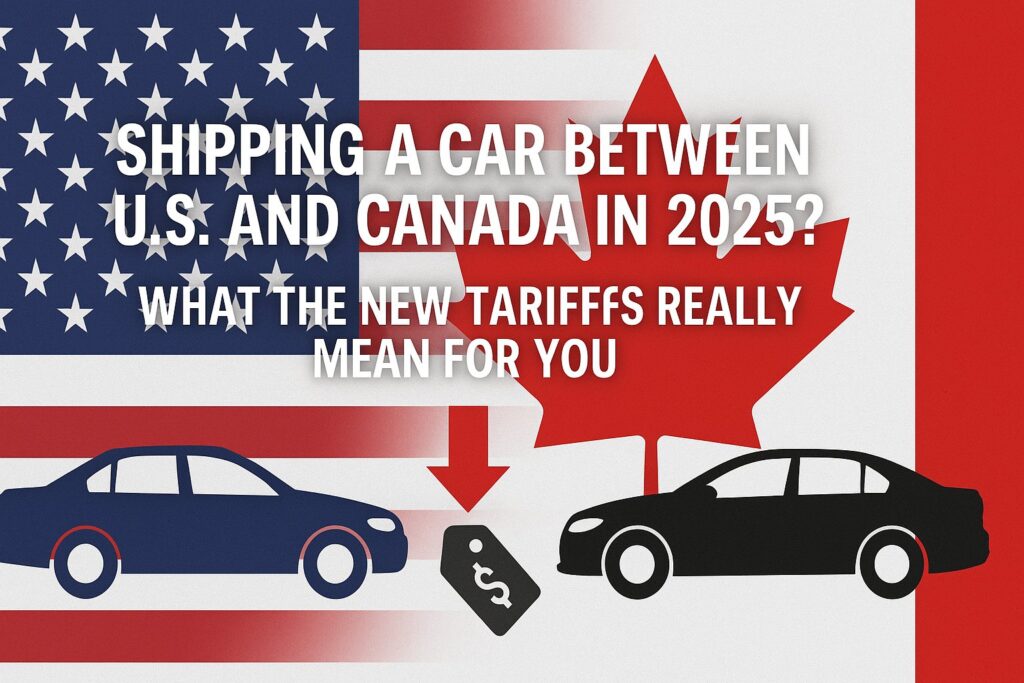The headlines are heating up again — U.S. President Donald Trump has reinstated a 25% tariff on imported vehicles, and Canada’s new Prime Minister, Mark Carney, has announced retaliatory tariffs on U.S.-made cars. If you’re planning to ship a vehicle across the border in 2025, this may sound like bad news. But don’t worry — most personal vehicle shipments are not directly affected, and we’re here to help you figure it out.
What Are the New Tariffs?
In early April 2025, President Trump imposed a 25% tariff on all imported cars, including vehicles from Canada. In response, Canada announced a matching 25% tariff on select U.S.-made vehicles, effective April 9, 2025. These tariffs are part of a broader trade dispute and are designed to protect domestic auto industries in both countries.
These tariffs mainly affect commercial vehicle imports and large-scale dealership orders — not most individual car shipments.
Do These Tariffs Affect Your Car Shipment?
Good news: If you’re a private individual shipping your own vehicle between the U.S. and Canada — for relocation, seasonal travel (snowbirds), or gifting — you’re likely not affected by these tariffs (contact us with the yr, make, model and we will tell you).
This includes:
– Personal-use vehicles
– Returning residents
– Canadian snowbirds heading south
– Vehicles bought before April 2025
However, if you’re importing or exporting a newer U.S.-manufactured vehicle for resale, or if you’re shipping multiple vehicles, it’s a good idea to contact us to confirm if your shipment falls under any tariff rules.
Don’t Panic — Contact the Experts
This is where we come in. At USCanadaAutoTransport.com, we’ve been handling cross-border vehicle shipments since 2003. We stay updated on the latest customs, tax, and tariff changes so you don’t have to.
Not sure if the new tariffs affect your shipment? We’ll help you figure it out — just contact us or submit a quote request and we’ll walk you through it.
Why Choose Us During Uncertain Times?
– We understand customs paperwork and import tax exemptions
– Door-to-door shipping between USA & Canada
– Personal vehicles, gifts, seasonal relocation, and more
– Real people. Real answers. Fast service.
Conclusion
Tariffs come and go — but we’re here to keep your shipment on track. Whether you’re moving, gifting a vehicle, or returning home, don’t let the headlines stress you out. Most people won’t be affected, and if you are, we’ll help you understand your options.
Get a Free Quote Today or call us with your questions — we’re happy to help.
Frequently Asked Questions About Tariffs & Cross-Border Car Shipping in 2025
I’m a snowbird — do the tariffs affect me?
No. If you’re a Canadian snowbird heading to the U.S. with your own car or returning home after winter, these tariffs won’t impact you. Seasonal relocations for personal vehicles are exempt from import duties and tariffs, as long as you’re not selling the car.
I’m buying a car in the U.S. and driving it back to Canada — should I worry?
It depends on:
– The country where the car was manufactured
– Whether it’s new or used
– If it’s for personal use or resale
We’ll guide you through customs declarations and help calculate duty and tax estimates, so you don’t get surprised at the border.
Can I still import my own car into the USA?
Yes — the 25% tariff targets new imported vehicles, particularly for dealerships or bulk importers. If you’re relocating or bringing your own vehicle into the U.S., you’ll still follow normal import procedures. No additional tariffs will apply unless it’s classified as commercial.
How do I find out if my vehicle qualifies for a tariff exemption?
Just ask us! We’ll look at:
– Vehicle make, model, and year
– VIN (Vehicle Identification Number)
– Country of origin
– Import purpose (personal, gift, resale, etc.)
Contact us or request a quote — we’ll research it for you at no charge.


